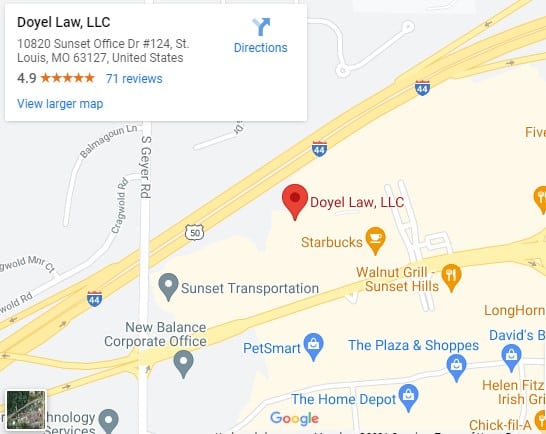Wage Garnishment Options Attorney in Sunset Hills, MO
Owing money to creditors can be unpleasant, but garnishing your wages is worse than that. You can be subject to financial limitations if that occurs. Luckily, as the debtor, you can lessen the hardship of wage garnishment under Missouri state law. It is crucial to speak with a Missouri wage garnishment attorney before the burden becomes due.
Our law office is committed to helping you escape the debt trap with our broad range of legal experience and competencies. Internet browsing won’t help the problem if your wages are going to be garnished. If you want the aid of a bankruptcy lawyer, contact us right now.
Why Do I Need a Knowledgeable Wage Garnishment Attorney in Missouri?
 You should pay extra attention if a creditor is about to garnish your wages since this can affect your standard of living once you keep track of it. Bear in mind a lawyer’s characteristics before choosing one. Consider these qualities if you’re wondering what a wage garnishment lawyer should possess:
You should pay extra attention if a creditor is about to garnish your wages since this can affect your standard of living once you keep track of it. Bear in mind a lawyer’s characteristics before choosing one. Consider these qualities if you’re wondering what a wage garnishment lawyer should possess:
- Skilled – Choose a wage garnishment lawyer with exceptional legal knowledge. A solid academic background and in-depth familiarity with Missouri state consumer law are requirements for your attorney. To ascertain whether an attorney’s services are sufficient, you can look at their testimonials and evaluations from previous clients, their training, and their work history.
- Focus on the practice area – You shouldn’t work with someone who focuses on criminal or constitutional law. If your wages are set to be garnished by a creditor, a lawyer can suggest that you file for bankruptcy. For that reason, you must speak with a bankruptcy attorney, particularly with bankruptcy law and Missouri law knowledge. This will guarantee you are consulting the right person regarding your wage garnishment cases and how to handle them.
- Availability – It concerns how you are doing financially, so consider a lawyer’s availability when choosing one. Wage garnishment is a serious matter. You or anyone else does not deserve to wait.
What is Wage Garnishment?
The term “wage attachment” or “wage garnishment” refers to a court order that permits your employer to deduct your wages and pay them to the creditor. Your wages may be garnished if you have a debt you have not paid off at a reasonable time or following an agreement. It is a formal legal procedure wherein the creditor asks the court to impose an order. In general, Chapter 525 of the Missouri Statute and the Supreme Court Rules contain the rules of judicial procedure. Federal legislation also governs wage garnishment laws. Working with a Sunset Hills attorney to stop wage garnishment is necessary. Your rights as a debtor will be protected by a wage garnishment attorney, who will also stop creditor harassment of you.Wage Garnishment Options in Missouri
You might be concerned about your ability to stop wage garnishment. Doing nothing and allowing your salary to be withheld until the debt has been paid off is the most beneficial option in certain cases. In some circumstances, it can be prudent to fight the garnishment (or the amount) alone, negotiate with the creditor, or retain legal advice. The following are some steps you can take to stop a wage garnishment order that your judgment creditor in Missouri has obtained:You are not liable for the debt
You should speak with a lawyer if you have already paid the amount or didn’t owe it in the first place. You are currently being garnished because a court or administrative body has ruled that you have a legal obligation to pay that debt. This makes it difficult to prove you don’t owe a debt once garnishment proceedings have started. In this specific situation, you will unquestionably require a lawyer’s assistance. An attorney can help you obtain the proof you need to show the debt isn’t owed and ensure that all formalities are followed.
Legal expenses will be greater than the debt amount
It might not be wise to employ a lawyer if it is anticipated that they will charge you more to represent you than the whole amount of the debt. Inquire upfront if hiring the attorney will cost more than you would have to pay toward the debt. A bankruptcy lawyer will give a straightforward response to that query.
The creditor is taking too much
When you learn that a garnishment has been filed, the court or the organization in charge of the administrative wage garnishment will send you a packet of information. The documents should outline the amount that can be deducted from your salary regularly. Federal law permits the creditor to seize up to 25% of your wages in the event of wage garnishment to satisfy a court judgment or the amount by which your income exceeds 30 times the federal minimum hourly rate, whichever is smaller. A lower amount is permitted in some states. Consult an attorney if you cannot or don’t want to handle it alone.
Pay the creditor
The wage garnishment ends after the debt is fully paid. You might be able to work out a settlement with the debt collector if you cannot pay the bill in full. If you pay the entire amount in a single payment within 1 to 2 months, the creditor can agree to take a reduced sum instead of wage garnishment.
In some cases, if you and the creditor agree to a wage garnishment settlement, make sure to get a written document describing the details of the arrangement before paying the creditor. Seek legal help first before you sign anything or provide money.
Filing for Exemption
Because you and your family depend on the money, you might ask to be excluded from the wage garnishment. For this debt relief, you must submit wage garnishment exemption paperwork. If you have an income exempt from debt wage garnishments, such as social security income or disposable income, you can also try using an example letter to stop the garnishment.
Remember that not all states permit you to ask for an exception, while others may.
Wage Garnishment Process in Missouri
Depending on the type of debt being collected, Missouri’s wage garnishment laws have different procedures. For instance, there are specific procedures to follow when taking child support and spousal support deductions from an individual’s income. There is no need for a court order for the federal government to withhold up to 15% of your income for delinquent student loans. This is only comparable to how the Internal Revenue Service (IRS wage garnishment) can take money out of your salary without a court order for outstanding tax debt. The wage garnishment process is carried out differently for ordinary debtors. Let us take a closer look at that process.Obtaining Personal Judgement Against You
A creditor won’t deduct money from your paycheck automatically since the debt is past due.- The first step is for the creditor to initiate legal proceedings to collect the debt and get a personal judgment against you. The following debts are typically the targets of debt collection lawsuits: credit card debts, medical bills, personal loans, outstanding repossession or foreclosure costs, and other unsecured obligations.
- After submitting the complaint to the court, the creditor serves a copy of it on you. The complaint contains a summary of the law, a description of the consumer debt, the amount you owe, and any pertinent details. According to the Summons, you have around one month to reply to the lawsuit.
- If you submit an answer or response to the lawsuit, the court schedules a trial date. If your response to the case is not submitted by the due date, the court schedules a default hearing. The default hearing is where the creditor establishes they served you with the case. They provide proof that you owe the money and haven’t paid it.
- The court imposes a default judgment if the creditor’s paperwork is adequate to show you owe the obligation. A “default judgment” is a court decision indicating that you owe the creditor a certain sum of money.
- The court clerk receives a copy of the judge’s final order and verdict. A wage garnishment order request is one of the subsequent legal actions the creditor may pursue to collect the debt.
Obtaining a Wage Garnishment Order
The creditor asks the court for a writ of execution. Here is an example of a Missouri execution warrant: a court order enabling your employer to deduct money from your paychecks is in the judgment attached to the writ. You deliver the garnishment packet to your employer. Your employer will begin deducting earnings from your first paycheck more than one week after the date of service. The tax levy officer, who could be a sheriff or marshal, is responsible for gathering the cash from the employer and delivering it to the creditor in Missouri. The wage garnishment order, also known as an Earnings Withholding Order, contains all the details required for an employer to begin income garnishment. Wage garnishments are given a high priority in Missouri. The precedence, starting from the top priority, is:- Wage and Earnings Assignment Order for Support
- Earnings Withholding for Support
- Earnings Withholding for Taxes
- Earnings Withholding for Elder or Dependent Adult Financial Abuse
- Order to Withhold Earnings
Contact our Trusted Wage Garnishment Attorney Now!
You do not have to wait for the court to issue a writ of garnishment if you or someone you know is about to find themselves in this situation. Seek legal counsel as soon as possible from a Missouri wage garnishment attorney who can examine your case and provide helpful recommendations on what steps you should take.
Our law firm, The Doyel Law, is always available to help you overcome your financial challenges and other legal services. Our commitment focuses on giving clients a unique, personal service to improve their life in cases involving bankruptcy, real estate, business law, or anything else. Get plastic card companies and other debt collectors off your back, and stop wage garnishment. Contact our Sunset Hills bankruptcy lawyers now to schedule a consultation.


